- Home
- Lissa Evans
V for Victory Page 8
V for Victory Read online
Page 8
‘Hey there!’ said the American, holding up a hand as if he were a traffic policeman, and then, in the same breath, continuing with an anecdote, his speech rapid and slightly hoarse: ‘—so that’s when they heard footsteps outside the storeroom and then the major opened the door and there’s Lonnie standing on a chair, holding the two-pound can of corned beef, and he snaps a salute with the same hand, and knocks himself out cold!’
Vee gasped, her expression that of a child at a pantomime.
‘Call me Mario,’ said the American, reaching over to Noel, hand outstretched. He was forty or thereabouts, with a large nose that someone had hit at some point, curly dark hair and eyes the colour of prunes. ‘Good to meet you. This lady says you’re in charge of the cookhouse.’
‘Look what Corporal O’Mahoney brought us,’ said Vee.
‘Mario,’ corrected the corporal.
‘Mario,’ repeated Vee. She swept a hand towards what looked like a shrine on the dresser – a carton of cigarettes topped by a bunch of bananas and flanked by two tins of golden syrup. ‘And this,’ added Vee, gesturing towards a brown paper bag on the table. ‘You’ll never guess what’s in it. Dried cherries! Take one!’
The cherry looked like something you’d prise off the sole of a shoe, and tasted like manna. Noel took two more.
‘Good?’ asked Mario.
Noel nodded.
‘Those cherries were picked, dried and sent across the ocean by my own mother, who is afraid that I will starve to death unless she can personally cook for me three times a day. In fact, it would come as no surprise to me if she volunteered and I found her serving my oatmeal tomorrow morning, and forcing me to take a third scoop. “The army’s letting my little Mario fade away!”’ he added, in a voice like Chico Marx, checking his watch as he did so. ‘Heck, I’d better head off.’ He stood up and banged his head on the lampshade, just as Miss Appleby entered the room. She performed a little skip of surprise and Mario gave a shrill whistle – ‘How many good-lookers can one house contain?’ – winked at Noel, said, ‘So long, see you Thursday’ to Vee, and left the room. The kitchen seemed suddenly dimmer and shabbier, the silence as noticeable as if somebody had just switched off a fairground ride. There was a long pause. Noel heard the gate slam shut.
‘I just came in to say that there’s a mouse in my room,’ said Miss Appleby, still blushing. ‘It’s dead,’ she added.
‘I’ll come and clear it up,’ said Vee.
‘Thanks.’ Miss Appleby left again.
‘Thursday?’ asked Noel.
‘Sorry?’ Vee was examining the syrup tins.
‘Did he say he was coming back on Thursday?’
‘He says he wants to take me out, just to say thank you.’
‘It’s the Methodist Christmas Party on Thursday.’
‘Oh, I forgot.’
‘I spent three evenings last week writing the prize quiz, after you asked me to.’
‘It went right out of my mind.’
‘Anyway, what does he want to thank you for?’
‘Well …’ Vee opened a cupboard and started to rearrange the contents with unconvincing concentration. ‘It was something about the coroner’s ruling,’ she said, her back to Noel.
‘What was the ruling?’
‘Oh, it was … let me think …’
‘Accidental death?’
‘Yes.’
‘So he got off. Because of your evidence.’
Vee turned to face him, suddenly indignant. ‘I did my best. I went there and I got a grilling. I could have told them it was all a blur in my memory, but I didn’t, so don’t go shaming me, Noel Bostock. I wasn’t the one driving the lorry.’
‘But he was. And now you’re going out with him to celebrate.’
‘It’s not a celebration, it’s a …’
She looked around the kitchen as if an alternative word might be written on the wall.
‘Celebration,’ said Noel, flatly.
‘I’m not arguing with you,’ said Vee. ‘I don’t have your knack with words. The corporal told me he was very sorry about what happened, and that he’d written a letter to Mrs Embleton, but if he’d been charged and gone to prison, how would that have made anything better? I didn’t mean to help him, but when it comes to it, I’m not sorry I did.’
‘And how did he find out where we lived?’
‘He spoke to the stenographer. And he knows the area, he said. He likes walking.’
‘You mean he likes walking when he’s not driving a gigantic lorry on the wrong side of the road?’
Vee pinched her lips and buried the tins of syrup right at the back of the cupboard, well out of Mr Reddish’s eyeline, should he choose to open the door. The lingering taste of the whole astonishing visit – the wild largesse, the exoticism of an American sitting at her table, the funny stories, the hole punched into her grey routine, the giddy lightness, as if the kitchen had been filled with laughing gas – had all dissipated.
‘I sold some golf balls,’ said Noel.
‘Is that so?’ Vee shut the cupboard and, without looking at him, took the cigarettes and hid them in the scullery, under a folded oil-cloth. When she returned, the kitchen was empty, but there was a small pile of money at the centre of the table.
‘Thank you!’ she called along the passage.
There was no reply.
The small child in the living room of Flat 3, Easton House, had gradually manoeuvred her way around the cluttered space until she had a clear view of Jepson’s missing ear. He was busy taking down her father’s story in shorthand, but he could almost feel the intensity of her gaze.
‘After that I just walked,’ said Private Birrell. ‘Bumped into an American unit – well, they looked like Americans, but they talked funny and I thought for a moment they were Germans in disguise, but it turned out they were all from Wisconsin. Sort of up-and-down accent, like Norwegians. They gave me a lift to … where was it? Ancona? Feels like half a year ago, and it was only last week. Ancona, I think, and then – I can see you, little Shirley Birrell, come out of there.’ He held out his arms to his daughter, but she stayed behind the drying rack, bending her knees so that she was concealed behind a hanging night-dress.
‘She doesn’t know me yet,’ he said. ‘She couldn’t even walk when I last saw her. And of course, I’ve never seen him at all.’ He nodded towards the high-chair where his wife was feeding the boy mashed carrots. ‘I only came home on a forty-eight-hour pass, didn’t I, Lena? That was just before we were sent to Tunis. The next letter I got from her was months later, when I was in the camp – You’ll never guess what’s happened, Tom …’ He winked at his wife.
‘Now stop it,’ she said, flustered, trying not to laugh. ‘And I hope Mr Jepson won’t print that bit in his paper. Come on, Shirley, let’s get your hair brushed.’ She hitched the baby on to her hip, and led the child out of the room. The door shut, but the walls were like cardboard, Shirley’s voice as clear as a choirboy’s.
‘That man’s got no ear.’
‘Shhh, don’t be rude.’
Birrell looked embarrassed. ‘Sorry. You got kids?’
‘No.’
‘Hark at me, voice of experience, I’ve only had ’em myself for about ten minutes, all told. I got called up in 1940, twenty years old, fancy free, met Lena first home leave, blinked twice and I’ve got a family. I don’t regret it, I’m not saying I regret it, but look at this place.’ He glanced around the room – the muddle of cheap furniture, a pile of ironing on the table, a makeshift play-pen for the baby in one corner, one wall missing half its plaster.
‘Oil bomb in the next street,’ said Birrell, nodding at the wall. ‘Still waiting for the landlord to do something. No hot water. This isn’t a place to bring up kids, but half the borough’s smashed up now, so where are we going to live? They’ll have to build, won’t they? Someone was saying they’ll need a million new houses, and they’ll have to do them properly – inside lavs, and modern heating and somewhere outsi
de for the kids to play. We haven’t spent half a decade being shot at just to come back and roll over and put up with the same old bollocks.’ He grinned, tiredly. ‘Maybe you shouldn’t print that either. But there’ll need to be a big shake-up when this is all over, won’t there?’
‘Oh, yes,’ said Jepson. ‘I think this government’s going to get a hell of a shock.’
He was interviewing returned soldiers nearly every week, now; the paper thought it gave a bit of lift to the front page (‘Home Again for Holloway Man’). Some had been liberated from prisoner-of-war camps by the Allied advance or had chanced an escape in the chaos of the German retreat; some were merely on leave, having crossed continents to get home; all of them, however convoluted or lengthy their journeys, had seemed shocked by the dismal grind of London life, the V-2s still slamming down, the queues for fuel, the frozen rubble. They were impatient for the end and scenting change; tin medals weren’t going to be enough this time round.
Mrs Birrell came back in. ‘Can I get you another cup of tea?’
‘No, thanks,’ said Jepson, checking his watch. ‘I’m off somewhere shortly. Just a couple more questions?’
She settled on the arm of her husband’s chair and Birrell rested a hand on her hip, an easy, tender gesture. Their faces were alike, in expression if not feature – they shared a straightforwardness, an air of unselfconscious decency; one would hope, thought Jepson, that they stood a good chance of happiness. Since the end, just a year ago, of his own, terrible marriage he found himself studying other couples, like someone conning an aircraft recognition chart – spotting those tics and phrases that signalled contempt or boredom or fear, and when he saw those, he wanted to take one or other of the pair aside, and say, ‘Finish it now. Don’t do what I did, and let it drag on for a couple of decades.’ But then, would he himself have listened? For a long time, he’d thought that those odd moments of shining joy were worth all the rest. It was only since Della had left, abruptly and irrevocably, that he’d seen the whole truth of it, as if those decades were a crumpled sheet of newsprint he’d smoothed out and made legible again.
‘So do you know where you’re being sent next?’ he asked.
Private Birrell shrugged. ‘I’m in no hurry,’ he said. ‘They’ll tell me when they want me. With any luck, I’ll get to Berlin just in time to spit in Hitler’s bunker.’
‘With any luck, you won’t get further than Dover,’ added his wife. ‘You’ve done your bit.’
Jepson typed up the piece at the office, entitled it ‘The Son He’d Never Met’ and gave it to the sub, who eschewed poetry and who would almost certainly change the heading to ‘Home Again for Caledonian Road Man’.
‘Fancy a pint?’ called Longford, from his desk in the corner, where he was sorting glumly through a sheaf of letters. Ninety per cent would be about the inadequacy of the council repairs department.
‘No, I’ve said I’ll go to the Hampstead Methodist Christmas Party.’
‘Really?’ Longford looked aghast. ‘Never took you for the religious type.’
‘You probably never took me for the tombola type either, but that’s what I’m in charge of.’
Mrs Overs had beckoned him aside the day before, just after breakfast; she’d been biting her lip with anxiety and he’d prepared himself for a rent increase, or another plumbing disaster. What she’d wanted, though, was a favour. ‘I’d be ever so grateful, Mr Jepson, I couldn’t think of anyone else to ask, Miss Appleby’s off seeing her Australian again, and Noel’s – well, to be honest, he’s in a bit of a huff with me at the moment. You’d only need to be on the stall between seven and eight, and if you could just tell Mrs Claxton – she’s the one in charge, you can’t miss her, Monty with a permanent wave – if you could just tell her that I’m feeling a bit off colour.’
‘Oh, I’m sorry about that.’
She’d darted him a look to see if he was serious. ‘Well, obviously, I’m not really. I’ve had a … well, an unexpected invitation.’ If she’d had a different sort of face, she’d have dimpled; instead, a smile – a rather lovely one – had briefly surfaced and then disappeared again. ‘But I don’t want you to feel you have to tell an untruth.’
‘Oh, I’ve told a few white lies in my time,’ he’d said.
The prizes for the tombola ranged from a fruitcake to a tin of pre-war talcum powder, speckled with rust. Each had a numbered ticket attached, and for sixpence, you could buy the chance to dip into a drum and pull out a matching ticket. ‘The thing is, Mr Jepson,’ said Mrs Claxton, in confidential tones, ‘we have a little system. If certain of the prizes were to go early on, then no one would buy any more tickets, so what we do is set aside some of the duplicate numbers – say for the fruitcake, or the tin of pears in cream – and only pop them into the drum later in the evening.’ Her expression bland, she slid a couple of tickets across the table towards him.
Jepson thought fleetingly of the article he could squeeze from this (‘Fraud Allegation Shatters Methodist Merriment’) and nodded understandingly, tucking the duplicates into his jacket pocket. The stall was situated at the back of the Drill Hall, between another selling knitted goods and a long table on which helpers were setting out sandwiches. An attempt had been made to decorate the room, faded crêpe-paper streamers pinned between the rafters, and a small holly bush in a tub in one corner, the decorations cut from tinfoil.
The place was dreadfully familiar to him from his four years of Home Guard parades, those interminable evenings of shuffle and stamp, of repetitious tasks and tedious duties, of winter rain on the windows and the pervasive smell of damp serge, of stifling summer nights when all one wanted to do was sit on a hillside with a beer.
Early in the war there had seemed some point to it – during the night Blitz, Jepson and other veterans from his platoon had been deployed on the crew of an anti-aircraft gun, thunderously loosing twenty-eight-pounders against the bombers – but during the years that had followed, as the threat of invasion receded, thrice-weekly attendance at the Drill Hall had become yet another petty home-front penance to be endured, and none of them had been sorry when the Guard was officially stood down in the autumn.
Jepson had reported for the North London Press on the final mass parade – seven thousand men selected from all over the country, boots shining, music playing, the King taking the salute. There had been one final absurd twist when the Irish Guard’s band had played the march-past at a fearful lick, too rapid for some of the older members, who had nevertheless managed to keep up, turning variously grey or pink, according to the condition of their hearts. Some of the watchers had laughed, and Jepson had had to turn away, pierced by the derision; they were laughing at men who, night after night, year after year, had come home after long shifts and then wearily changed into khaki before setting out again, unpaid, unlauded. And he remembered Della, pressing a hand to her smiling mouth after seeing him in his Home Guard uniform for the first time. ‘Sorry,’ she’d said, ‘I know you can’t help your ear, but that helmet does look silly, all tipped to one side.’ It was painful, now, to think that he had smiled back.
‘We’ll be opening the hall doors very shortly,’ said Mrs Claxton, ‘and once they’ve eaten all the buffet – and they will, Mr Jepson, it’ll be like the Gadarene swine – we’ll begin the entertainment. We have quite a full programme.’ She gestured towards the blackboard propped on an easel beside the stage; an elderly minister was chalking ‘QUIZ’ at the bottom of a long list, and Jepson spotted the name ‘Reddish’ halfway down, next to the ominous word ‘Recitation’.
‘I’m sorry, though,’ continued Mrs Claxton, ‘that Mrs Overs is unwell. Was it sudden? Her nephew didn’t mention anything about it when he arrived earlier.’
‘A bilious attack, I believe,’ said Jepson, looking around for Noel, and spotting him sitting on his own in the middle of the rows of empty chairs, studying what looked like a letter. It had arrived that morning. Noel, sorting the post into piles for the lodgers, had been surprised t
o find one envelope addressed to himself. It contained a single sheet of notepaper, and amidst the neatly written lines, the word ‘Simpkin’ had drawn his eye as if picked out in gold leaf.
… and I promised to let you know what happened to the Green Man carving found in the church ruins. It’s been taken to the Victoria and Albert Museum, but the expert wasn’t able to tell me whether it would be on display or not, as most of the portable contents have been taken out of London for safety. Incidentally, your postal address rang a very happy bell with me – when I was younger than you, I belonged to a club for girls called the Amazons, run by an extraordinary woman called Miss Matilda Simpkin, who lived in Green Shutters (she called it ‘The Mousehole’) and who had been a suffragette. I think I remember hearing that she died a few years ago, but I’m sure some of the local residents will still remember her. I once broke a pane in your next-door neighbour’s greenhouse with a badly aimed javelin!
Yours sincerely,
Winnie Crowther
And his godmother Mattie was back in his head, whole and vivid, her voice as clear as if she were shouting through the letter-box, and he was once again at the warm centre of a world in which his every speech and action provoked enthusiasm and comment: ‘Yes, well remembered, young Noel, it is indeed called a pilum, and I think that with your sureness of grip as well as your grasp of Latin vocabulary, you would have made a very fine Roman legionary. Incidentally, I was in the bath and I suddenly realized that it’s possible to sing the words of Lars Porsena of Clusium to the tune of ‘My Old Man Said Follow the Van’. Shall we give it a go?’
That sensation of warmth had dwindled during the day, snuffed out finally by Vee’s question in the hall that evening, as he’d pulled on his balaclava:
‘Where are you off to?’
He’d looked at her, incredulously. ‘The Drill Hall. The Methodist Party.’
‘Oh, yes, sorry, I keep forgetting.’
She was wearing lipstick, and a dress that he didn’t recognize, and in response to his stare she checked her appearance in the hall mirror, though the glass was so old that every reflection looked fickle, freckled. She dabbed at her mouth.

 V for Victory
V for Victory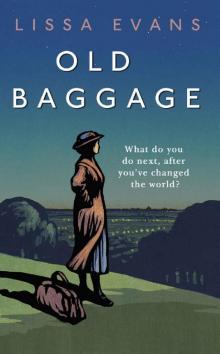 Old Baggage
Old Baggage Wed Wabbit
Wed Wabbit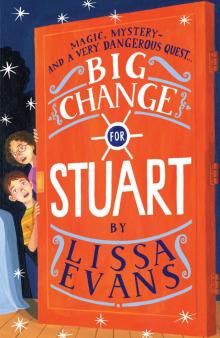 Big Change for Stuart
Big Change for Stuart Spencer's List
Spencer's List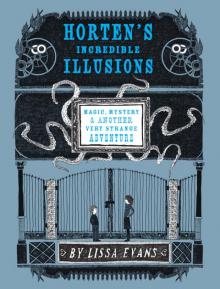 Horten's Incredible Illusions
Horten's Incredible Illusions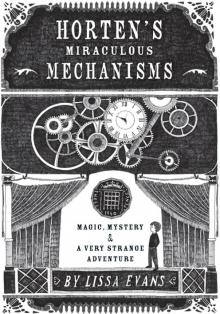 Horten's Miraculous Mechanisms
Horten's Miraculous Mechanisms Their Finest Hour and a Half
Their Finest Hour and a Half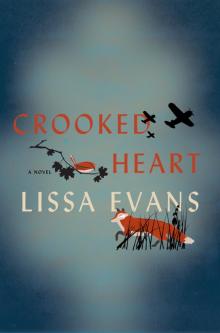 Crooked Heart
Crooked Heart